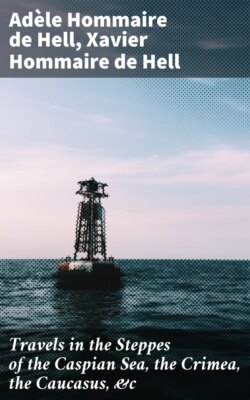Читать книгу Travels in the Steppes of the Caspian Sea, the Crimea, the Caucasus, &c - Xavier Hommaire de Hell - Страница 15
На сайте Литреса книга снята с продажи.
APPENDIX TO CHAPTER VII.
ОглавлениеTable of Contents
A propensity to sedentary habits is not peculiarly a female failing in Russia, as will appear from the following extract: "The Russian has as little taste for promenading on foot as any Oriental. Hence, with the exception of the two capitals, and the north-west provinces, in which German usages prevail, there are no public walks or gardens for recreation. True enjoyment, according to the notions of the genuine Muscovite, consists in sitting down to a well-furnished table, either in his own house or a neighbour's, and indulging after the repast in some game which requires the least possible exertion of body. Soon after my arrival in Kasan, I was glad to employ the early days of summer, which there begins at the end of May, in making pedestrian excursions in the neighbourhood, to the great and general surprise of my new friends, who could not conceive why I thus roamed like an idiot about the country, in which I had no business, as they very well knew. It was conjectured that I was ill, and had adopted this laborious discipline as a mode of cure; but even under this interpretation my proceedings seemed very strange to them, for their own invariable practice when they feel unwell, is to go to bed immediately. In one of my walks I fell in with an acquaintance, who asked me what took me to the village, to which he supposed I was going. On my replying, that I had nothing whatever to do there, and that as yet I had neither seen the village nor any of its inhabitants, he said then of course I was going to look at it. No, I told him, that was not my intention, for I knew very well I should see nothing there different from any of the other villages in the vicinity. 'Well, then, Daddy (batiushka),' said my puzzled and curious friend, 'do tell me, what is it you are afoot for?' 'I am afoot, simply for the sake of being afoot,' was my answer, 'for the pleasure of a little exercise in the open air.' My friend burst into a loud fit of laughter at this explanation of my rambling habits, which had so long been an enigma to himself and every body else. To walk for walking sake! He had never heard any thing like that in all his life, and it was not long before this most novel and extraordinary phrase ran the round of the whole town, so that even to the following year it remained a standing joke against me in every company I entered."—Von Littrow.
Suffocating vapours.—Accidents like that which befel Madame Hommaire, are unavoidably frequent under such a system of warming, and with servants so negligent as those in Russia; but happily they do not often end fatally. The worst result of them is generally a violent headache, all trace of which disappears the following day. Incredible as it may appear, the common people take pleasure in the sort of intoxication produced by the inhalation of diluted carbonic acid, and purposely procure themselves that strange enjoyment on leisure days. "They close the stoves before the usual time, and lie down on them; for in the peasants' houses the stoves are so constructed as to present a platform, on which the family sleep in winter. On entering a cabin on these occasions, you see the inmates lying close together on their bellies, chatting pleasantly with one another. Their faces are tumid and of a deep red hue, from the effects of the noxious gas. There is an unusual lustre in their protruding eyeballs, and in short, they have all the outward appearance of intoxication, though the intellectual functions are not affected by the gas. The headache they suffer may, indeed, be a drawback to their pleasure, but the increased warmth thus obtained, is so delightful to them, that they are content to purchase it even at that price. There is no mistaking their evident enjoyment and satisfaction, though one may not be tempted to partake in their joy."
Another mode of obtaining artificial heat is practised in what the Russian peasants call their smoke-rooms. These rooms have but a few very small windows, just large enough to pass the head through, and seldom glazed, except with talc, where that mineral is abundant and cheap. Where this is not the case they are stopped up, in winter only, with moss and rags. When the fire is lighted, the chimney is closed, and the smoke escapes through the stove-door into the room. Being lighter than the cold air, it ascends at first, and hangs overhead in a thick cloud. But as its mass increases, it gradually descends, until there is no standing upright in the room without danger of suffocation. As the smoke approaches the floor, so too do the inmates, first stooping, then kneeling, sitting, and at last lying prone. If the smoke threatens quite to reach the ground, they open the windows or air-holes, which are not quite level with a man's head, and the black vapour rushes out. The under part of the room is thus left free, the prostrate inmates gradually rise, and set about their occupations in the clear warm space below. The first time I entered one of these dark sooty dens, I was so disgusted with it, that I should not have hesitated in my choice between a prison and so horrible an abode. I was, therefore, not a little surprised when I saw the inmates lying on the floor, gossiping quite at their ease, and bandying about jokes that will hardly bear repeating, but which manifested a degree of mirthfulness in these people I had, until then, thought quite impossible."—Idem.
